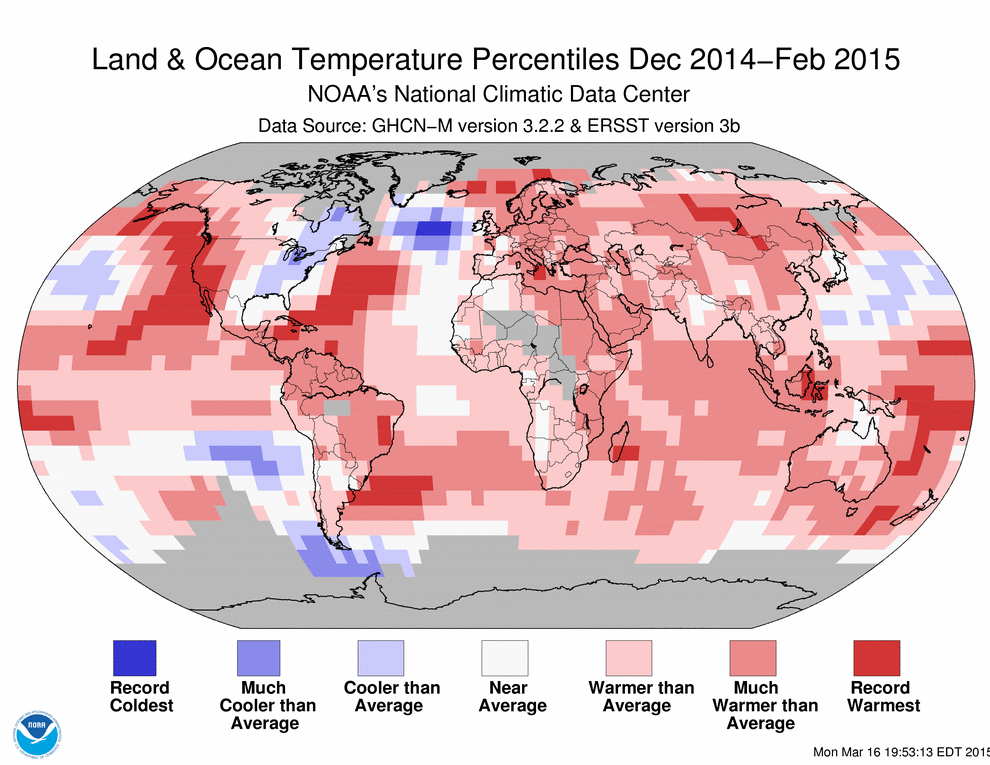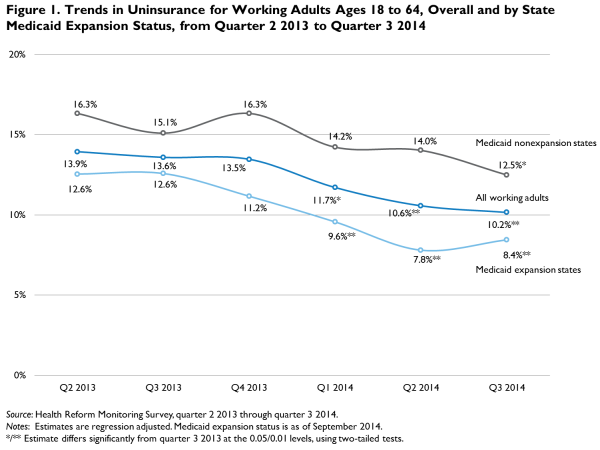Things I will read or explore more this weekend:
Must run.
The National Aeronautical and Atmospheric Administration (NOAA) reported today that the climatalogical winter of December 2014 through February 2015 was the warmest on record, despite what happened in the eastern United States and Canada:
During December–February, the average temperature across global land and ocean surfaces was 1.42°F (0.79°C) above the 20th century average. This was the highest for December–February in the 1880–2015 record, surpassing the previous record of 2007 by 0.05°F (0.03°C).
During December–February, the globally-averaged land surface temperature was 2.63°F (1.46°C) above the 20th century average. This tied with 2007 as the highest for December–February in the 1880–2015 record.
Even with record cold from Maine to Alabama, it was the 19th warmest winter in the Lower 48—in part because five states in the west experienced record heat and six more got into the 90th percentile.

Just hours after a jury handed down a $26-million verdict against the company, Yellow Cab filed for bankruptcy protection overnight:
The verdict was reached around 7 p.m. Tuesday. At 3:45 a.m. Wednesday, Yellow Cab Affiliation Inc. of Chicago filed for Chapter 11 reorganization with the U.S. Bankruptcy Court in Chicago, according to the court documents.
In its filing, company officials said Yellow Cab is "experiencing financial difficulty due to, among other things, a judgment entered against the company in the Circuit Court of Cook County."
Robert Clifford, the lead attorney for the couple, said the bankruptcy filing means "they may never see a dime."
Given that the verdict was announced around 7 p.m. and the court hearing ended at 8 p.m., the bankruptcy filing must have been a "long planned strategy to avoid accountability and responsibility," Clifford said.
Not that taxi companies have a history of shady dealings, despite my ongoing efforts to retrieve an insurance deductible from an incident a few months ago. And not that private-ride companies are grinding down taxi profits even more. But still, this is egregious.
Rebecca Leber at New Republic states the obvious:
The phrase, “believe in climate change” returns almost a quarter-million Google results. As McCarthy said, science is neither a faith nor a religion, yet the term belief pervades media and politics. Why do advocates so consistently play along with the climate-change-denier narrative?
Conservatives have long drawn comparisons between climate change science and a fervent religion. A 2013 National Review column articulated the parallels thus: “Religion has ritual. Global-warming alarmism has recycling and Earth Day celebrations. Some religions persecute heretics. Some global-warming alarmists identify ‘denialists’ and liken them to Holocaust deniers.”
Leber makes good points, but it's not a great article. I'm posting it because I agree with her main point, and also because it's an example of the slide in quality at TNR since they destroyed their editorial board.
Business lunch, business dinner, 8:30am call, 1:30pm call—and right now, six minutes to click "Send to Kindle:"
Time to get some water, plug in my Fitbit, and prep for my 1:30 call.
People who have read The Daily Parker know I have strong feelings about Le Corbusier, the French architect who nearly destroyed central Paris and who designed the vertical slums that packed in impoverished Americans like cattle. So I found it interesting when I received this email:
I saw that you were interested in Le Corbusier when I stumbled upon your page - www.thedailyparker.com/PermaLink,guid,a36518c4-5f44-4e64-813a-2a9c08ef9c9d.aspx By happenstance, I’ve been working on something that you might find compelling.
For the past two years, Artsy has developed a beautifully designed informational page for Le Corbusier. It includes beautiful images of his work, exclusive articles, and up to date information about his exhibitions. Artsy offers a new way to explore art around the world. I’d like to suggest adding a link to Artsy's Le Corbusier page as I believe it will give your audience a fresh perspective on art.
Oh? Well, I come to bury Corbi, not to praise him. My response:
Thanks for reaching out, and for sending the link. I’d like to post your message (with identifying information removed).
The thing is, though, I really despise Le Corbusier. His architecture was almost anti-human both at a macro and a micro level. He advocated destroying some of the most livable and inviting urban areas in the world—Greenwich Village, the 5th Arrondissement of Paris—in favor of concrete slabs surrounded by dead zones that no sane person would ever want to inhabit. Where he succeeded in this vision, the results have been disastrous. Here in Chicago, for example, the Corbusier-inspired Robert Taylor Homes and Cabrini-Green housing developments became vertical slums within a year of opening, and no amount of evidence that this was happening could convince Le Corbusier to change his approach.
Without Jane Jacobs to shut down his soul-destroying efforts in New York, he and Robert Moses would have destroyed the city. Here in Chicago we’re only now clawing back the damage his ideas did to our environment.
As intellectual exercises his buildings are interesting. As structures that people live and work in, they’re harmful.
So, OK, link posted, with both perspectives as presented. But as I've said before, I look forward to the day when people generally hold Le Corbusier in the same esteem they hold Pachelbel and Kinkade.
CityLab's Eric Jaffe takes a good look:
Let's acknowledge, right from the start, that there's a lot to like about Chicago's long-awaited, much-anticipated Central Loop BRT project, which is scheduled to break ground in March. The basic skeleton is an accomplishment in its own right: nearly two miles of exclusive rapid bus lanes through one of the most traffic-choked cities in the United States. The Central Loop BRT will serve six bus routes, protect new bike lanes, connect to city rail service, and reduce travel times for about half all people moving through the corridor on wheels. Half.
Officially, CTA says the Ashland plans are proceeding at pace. The agency is considering public feedback gathered during community meetings in 2013 and working through the "higher-than-anticipated number of comments," as part of the standard procedure for a federal environmental analysis. Meantime, CTA continues to pursue funding for the project's next design. Spokesman Steele says it's "too soon to tell" what a timeline for the corridor will be.
BRT solves the problem of getting people around quickly without building new rail lines. Chicago's geography makes BRT development a lot easier than it would be in other cities as well. It would be cool if, a year from now, I'm whizzing to the Loop in 20 minutes by bus, instead of my current 40.
Chicago's municipal election last night failed to elect a mayor:
Chicago's incumbent mayor now is destined for an April 7 runoff election against Cook County Commissioner Jesus "Chuy" Garcia in an unpredictable battle over the city's future and the right way to get there.
With just 5 percent of precincts yet to report, Emanuel had 199,861 votes, a bit over 45.4 percent. He hovered at that level most of the evening.
It was agonizingly close for him, but still short of the 50 percent-plus-one vote he needed to avoid a runoff.
So, six weeks from now, we have another election. It's not clear at this point which of them will win, because all of Emanuel's challengers appear to be endorsing Garcia now.
Between rehearsals, work, and life, I haven't had a lot of time during the day to goof off keep abreast of world developments. So here's what got sent to my Kindle just today:
Also, if you live in Chicago, go vote today.
Since Obamacare took effect, millions of Americans have gotten health insurance:

The percentage of uninsured Americans has fallen from 13.9 percent to 10.2 percent since Obamacare coverage took effect, according to new data from the Urban Institute.
The difference is even more pronounced in states that expanded Medicaid under the law. In those states, the uninsured rate dropped from 12.6 percent to 8.4 percent from the second quarter of 2013 to the third quarter of 2014.
In states that didn't expand Medicaid, the uninsured rate still fell but not quite as significantly: 16.3 percent to 12.5 percent.
In short, Obamacare is doing what it set out to do.